Coconut is a familiar fruit-bearing plant in Vietnam, particularly in coastal regions. Coconuts serve various purposes in daily life, from being a source of food and beverages to medicinal remedies and even construction materials. However, not every location is suitable for efficient coconut cultivation.
So, Where do the coconuts grow well? Where can coconut trees grow? This article aims to provide insights into these questions. Have a read!
Contents
1. An Overview of The Coconut Tree
Coconuts, also known as coconut palms, scientifically named Cocos nucifera Arecaceae, belong to the Arecaceae family. Where can coconut trees grow? There is still much debate among botanists about the precise origin of coconuts. Some believe coconuts originated in Southeast Asian countries, while others argue that they may have originated from the northwestern regions of South America.
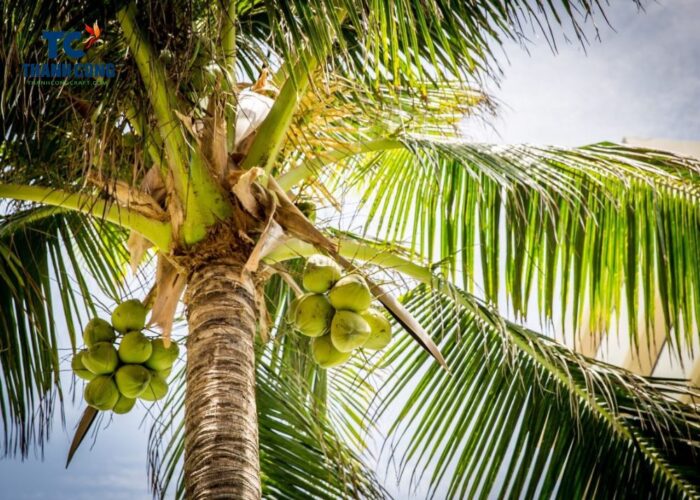
Where do the coconuts grow well? Coconut trees thrive in well-draining sandy soil and exhibit good tolerance to salt. They prefer regions with abundant sunlight and rainfall. Consequently, they have become an essential part of the livelihoods in tropical coastal areas. They are nearly impossible to cultivate in regions with extreme temperature variations, such as the Mediterranean (due to low humidity). In terms of morphology, the coconut tree is evaluated based on its external characteristics.
- Trunk: The trunk of a coconut tree grows straight and does not branch out. This species typically reaches an average height of 15 to 20 meters. In its initial four years, the coconut tree’s growth is relatively slow. The number of leaf scars on the trunk, starting from one meter upwards, is one of the key indicators used to assess the growth and development conditions of the tree.
- Roots: Coconuts possess an extensive system of continuous, rapidly growing, and indeterminate roots at the base. When young, these roots are white, gradually transitioning to a reddish-brown color.
- Leaves: A mature coconut tree has approximately 30 to 35 fronds or leaves. Each frond can measure between 5 to 6 meters in length. A frond consists of two parts: the petiole and the leaflet. By examining the canopy of leaves, one can evaluate the tree’s growth potential and its capacity to yield coconuts.
- Flowers: The period from planting to the appearance and blooming of flowers typically spans from 30 to 40 months. Each leaf axil carries a cluster of flowers, so the number of new leaves determines how many flowering events occur each year.
2. Where Do The Coconuts Grow Well?
Coconut trees are remarkably easy to cultivate, exhibiting versatility in soil preferences. They thrive and yield well in regions with elevations below 600 meters above sea level. Where do the coconuts grow well? Coconut palms flourish best in soils rich in peat, sandy soil, organic matter, and notably, soils abundant in potassium. The cultivation layer should be at least 0.5 meters deep.
The ideal temperature range for coconut trees is between 27°C, with fluctuations between 20°C and 34°C. Temperatures lower than 15°C can disrupt the physiological processes of the tree. Consequently, coconut cultivation at altitudes above 500 meters tends to yield lower results due to temperature variations.
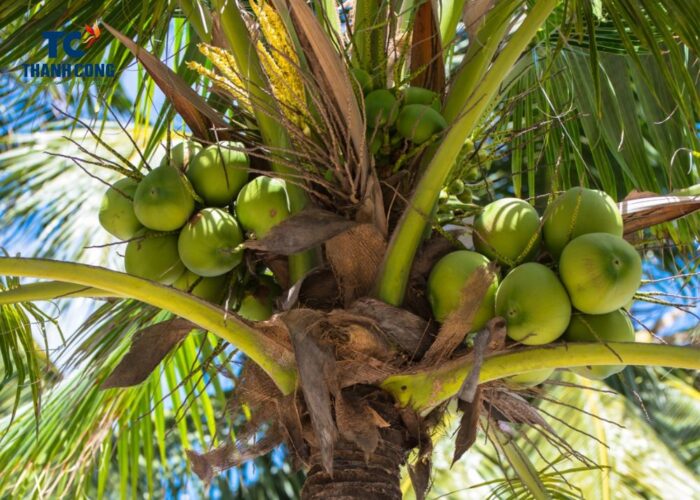
Coconut trees can be grown in areas with annual rainfall ranging from 1,000 to 4,000 millimeters. The ideal annual rainfall ranges from 1,500 to 2,300 millimeters, evenly distributed throughout the year. The preferred relative humidity level is between 80% and 90%, with humidity below 60% potentially causing premature fruit dropping.
Where coconut trees grow? Coconut trees thrive in bright sunlight, requiring a minimum of 2,000 hours of sunlight annually, with 120 hours of sunlight per month being optimal (approximately 4 hours per day). Gentle winds aid in pollination and fruit setting while enhancing the tree’s transpiration rate, thereby improving its water and nutrient absorption capabilities.
See also: Coconut tree vs palm tree: the differences
3. The Applications of Coconut In Daily Life
- Coconut Candle Bowls Wholesale: Crafted from 100% soy wax, which is derived from soybeans and does not produce any harmful chemicals or soot when burned. The soy wax is poured into real coconut shells, which are cleaned, polished and cut to create unique and beautiful containers. The coconut shells are also biodegradable and reusable, so you can reduce waste and enjoy them for a long time. Our Coconut Shell Soy Candles come in a variety of fragrances, such as vanilla, jasmine, lavender, sandalwood and more. Each candle has a burn time of about 20 hours, and emits a soothing and pleasant aroma that will fill your space with warmth and comfort.
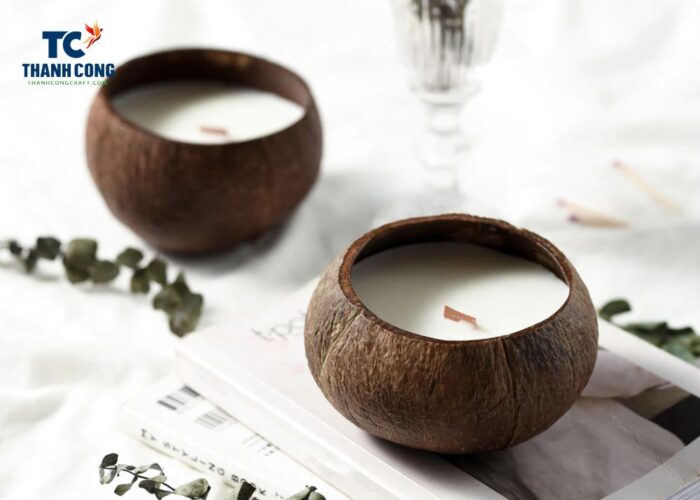
- Coconut Chopsticks: Coconut chopsticks are 100% natural, handcrafted from the palm wood of aged coconut trees. Sourced from coconut trees that no longer bear fruit, these chopsticks are transformed into unique pieces of art by local artisans. Coconut chopsticks are excellent for enjoying rice, noodles, and various other dishes. These coconut chopsticks are a versatile choice suitable for any occasion, and they pair beautifully with your coconut shell bowl. Notably, the exquisite grain patterns in these chopsticks are truly mesmerizing and are sure to captivate your senses.
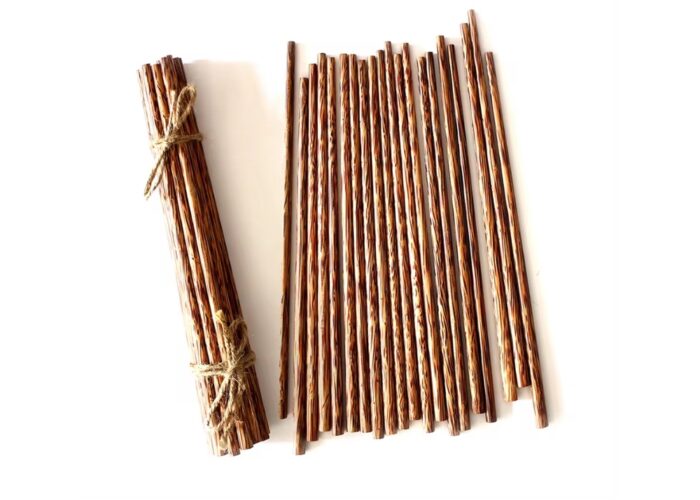
- Coconut Spoons: Made from coconut wood, coconut spoons are perfect for savoring soups, porridge, and other culinary delights. They offer excellent hardness, do not bend or develop mold, and feature a delicate coconut scent. The coconut wood spoons are also perfect for spooning up delicious smoothie bowls from your coconut bowl and bring a tropical flair to your home!
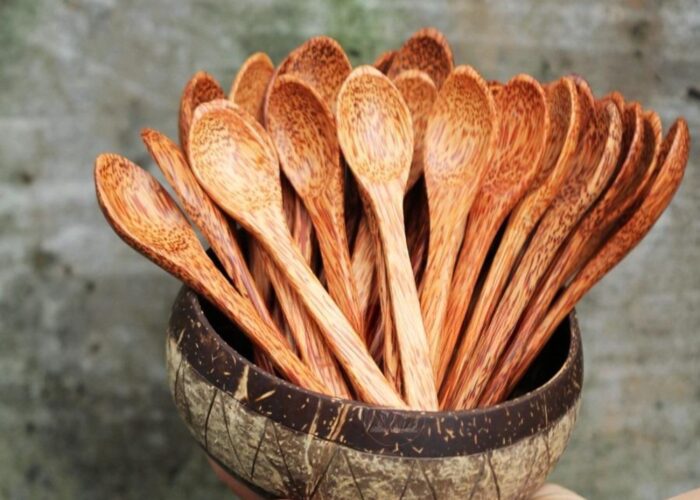
- Coconut Bowls Wholesale: Made of 100% coconut natural material, carefully handcrafted, polished, and other processes to give you a soft and straightforward touch with no nicks or scuffs, no coconut hair, and certainly no scent of coconuts. The outside bowl is engraved with simple and curving lines, which impress your eye. This coconut bowl is food safe and durable, which is the perfect way to serve up your favorite sweet or savory recipes over and over again with hot or cold food. This thin and lightweight coconut bowl is ideal for the entire family and will undoubtedly be a conversation starter at any dinner party, thanks to its vintage color and delightful natural wood aroma.
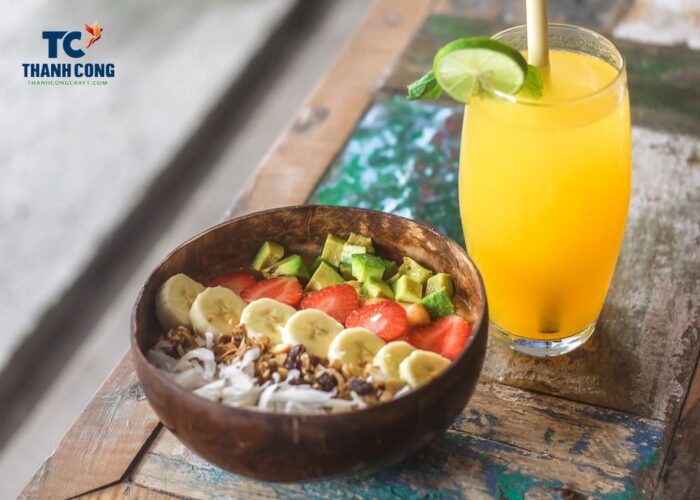
- Coconut Shell Candle Holders: Our Coconut Shell Candle Holders are exquisite and eco-friendly decorative pieces that bring a touch of tropical elegance to your living space. Handmade by Local Artisans: Each coconut candle holder is a piece of art, crafted by hand and beautifully designed by a team of skilled artisans in Vietnam so you can enjoy them whether they’re on your fireplace, mantle, shelf, in your kitchen, living or dining room, or as decorative centerpiece.
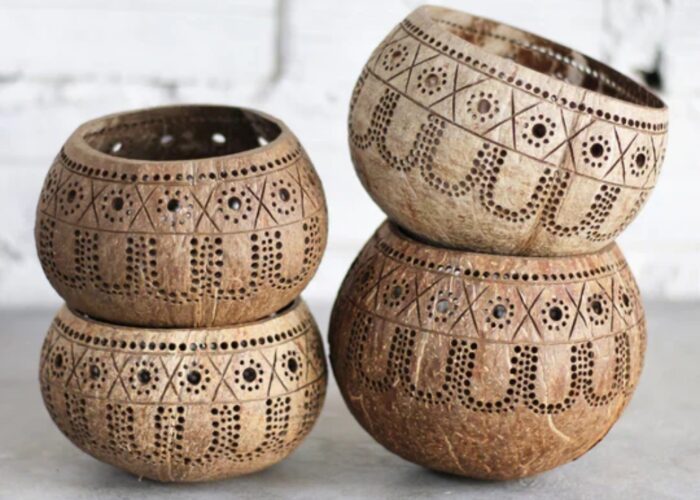
- Coir Brushes – Coconut Brush: These are natural, high-quality, handmade coconut fiber coir cleaning brushes. They are the perfect zero waste alternative to those plastic scrubbers.
This Coir Brushes is easy to use with its comfortable handle and natural fiber bristles which helps to remove grease and dirt. The coconut fiber is naturally antimicrobial and the brush is completely biodegradable. The coir are extracted from the husk of coconuts which is usually discarded after its juice and meat have been consumed. Considered merely but a waste we use this coir to make natural cleaners to create a plastic-free safe environment.
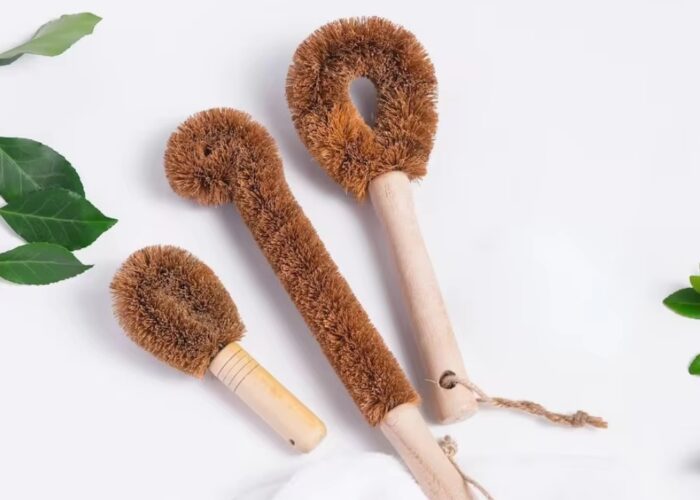
From luscious curries to delectable desserts, coconut cream has shown its remarkable versatility, elevating flavors and textures across a range of dishes. Whether you’re a seasoned chef or an aspiring home cook, don’t hesitate to experiment with coconut cream in your recipes.
If you have any further questions, please don’t hesitate to contact Thanhcongcraft email at [email protected] or message us at WhatsApp: +84967485411. Hope to serve you soon! Best regard!


